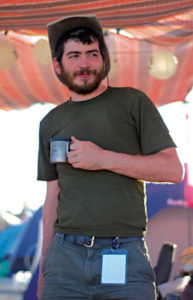 |
| Bryan McLellan |
By Betsy Garrold
Systems and communications: Those are the two words that describe Bryan McLellan’s volunteer job at the Common Ground Country Fair.
For years as a teenager, McLellan worked with Matthew Strong, first in his food booths and then on parking and communications for the three-day mega event. He left Maine for a six-year stint in Seattle but returned to be closer to family. He re-met an elementary school classmate, and they married and settled in Surry. Now McLellan volunteers on MOFGA’s board of directors, executive committee and Fair steering committee (which he chairs) and is one of the coordinators for communications, traffic and parking at the Fair.
Big events are not new to McLellan. He spent several years on perimeter patrol at Burning Man in Nevada, making sure that no one got onto the site who wasn’t supposed to and, more importantly, that no one wandered into the desert at night in an altered state, only to wake up in the morning lost in a dry, barren landscape with no water.
He says he has two rules for the traffic at the Fair: Don’t get hit by a car and don’t let the cars stop. Over the years he and the rest of the parking crew have worked out how best to do both. He works closely with the Waldo County Sheriff’s department to change the traffic pattern around MOFGA’s grounds during the Fair to move fairgoers efficiently onto and off the grounds. As with most of the volunteer parking staff, he is rarely on the actual fairgrounds. At the 2014 fair he spent a lot of time in the north parking lot, because the north side of the fairgrounds has more parking lots than volunteer coordinators.
McLellan says everyone has a suggestion for improving traffic flow at the Fair. No one wants to wait long to get into or out of the grounds. While the traffic and communications crew is open to suggestions, McLellan says, “We need help more than we need suggestions” – starting with someone to coordinate the north parking lots.
Communications at the Fair have been enhanced over the years by a growing collection of walkie-talkies, which McLellan inventories and tests before the Fair. Different channels have different purposes, including direct channels to the sheriff’s deputies on site. If you call 911 on your cell phone at the fairgrounds, that call goes to the county dispatch center in Belfast, and EMS personnel on the fairgrounds are dispatched directly.
Outside of his volunteer work for MOFGA, McLellan works for Chef, a well-funded, open-source software development company with such progressive policies as a 12-week paid parental leave – a benefit McLellan will use when he and his wife’s second child is born in July. He also is the training officer for his local fire department and helps with the family’s 1,000-acre woodlot, which is in the Tree Growth Program. He got his pilot license some time ago and recently added flying helicopters to his skill set.
His work at Chef informs a lot of his philosophy about how organizations work. On his website, loftninjas.org, McLellan says, “It is commonly accepted among people that aren’t fools that you can build better systems in the open than behind closed doors.” This kind of collaborative, open work style makes McLellan good at his volunteer gig. After returning from the 4th Annual ChefConf user conference attended by 1,500 end users in Santa Clara, McLellan talked about Parkinson’s Law of Triviality, also known as bikeshedding, bike-shed effect or the bicycle-shed example. This is C. Northcote Parkinson’s 1957 argument that organizations give disproportionate weight to trivial issues – something he works hard to avoid so that the big issues aren’t ignored.
Empowering people to “do the right hard thing” makes a difficult job, such as managing traffic patterns for the Fair, easier. Like hovering in a helicopter, managing that traffic is a lot harder than it looks. Keeping a copter in one place requires a deft touch on the controls, and keeping cars moving and fairgoers happy takes a lot of fine tuning.
